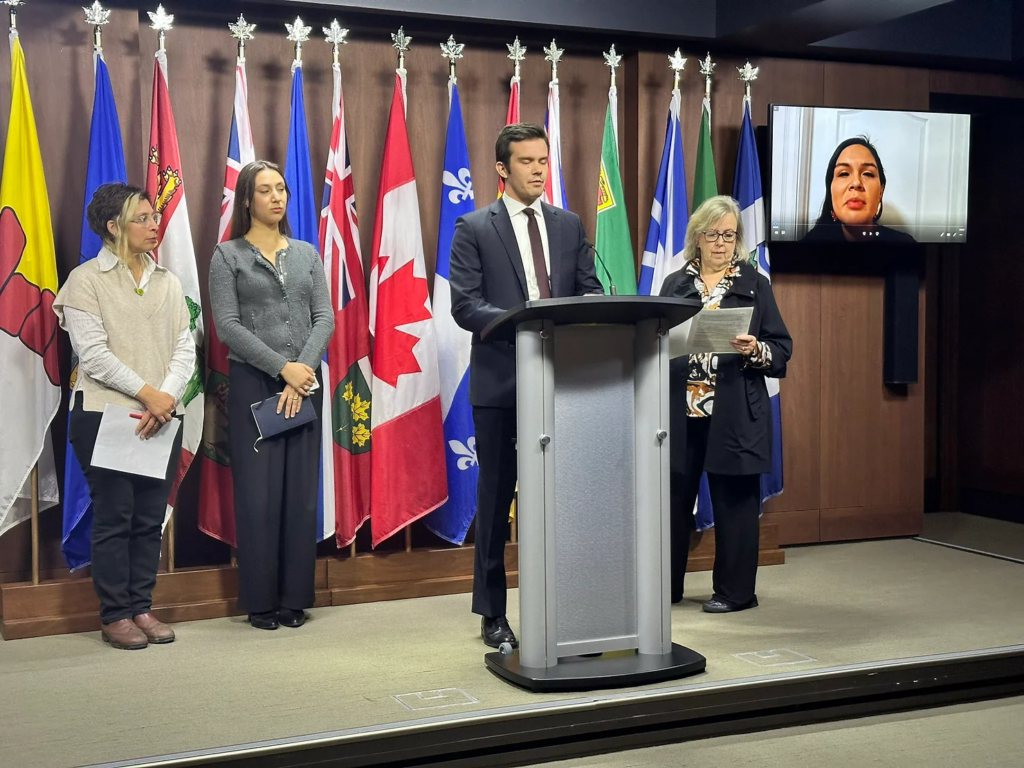By Kirsten McRae
In November of 2023, The Shift joined an existing coalition of more than a dozen non-profits and human rights organizations that constituted the Stop RBC Takeover Campaign, aiming to halt the acquisition of HSBC Canada by the Royal Bank of Canada (RBC). Although a smaller coalition of organizations had been fighting RBC’s unethical business practices for years, the acquisition of HSBC Canada by the fossil fuel giant spurred others to join forces in a united front against the expansion of RBC’s influence in the financial sector.
Deemed the worst bank in the world for climate change, RBC’s ongoing financing of high-emitting companies and projects, totaling over C$340 billion in fossil fuels since the signing of the Paris Climate Agreement, has raised alarm bells among environmental and Indigenous rights groups for years. RBC’s lack of company policies regarding Free, Prior, and Informed Consent further exacerbated concerns about Indigenous rights violations.
While HSBC Canada’s business practices had its flaws, the smaller bank has had more ambitious sustainability commitments, including a global policy to stop financing new oil and gas projects, and set a precedent toward sustainability that RBC’s acquisition all but did away with, as RBC was exempt from honoring HSBC’s existing climate commitments. The merger not only reduced competition within the banking sector but also jeopardized the progress made by HSBC Canada in promoting sustainable finance.
The Stop RBC Takeover Campaign demanded accountability from RBC and urged Chrystia Freeland, the federal Minister of Finance to consider the implications of the merger on sustainability, Indigenous rights, and consumer welfare. In an open letter to the Minister and a press conference, the group asked that the merger either be rejected outright, or approved contingent upon RBC fulfilling a Credible Climate Plan and pledging to meet or surpass HSBC’s global commitments to ceasing investments in fossil fuels. Although the potential impacts of the merger on mortgage rates and cost of living are briefly mentioned in the open letter, the importance of this issue was emphasized during the press conference, with The Shift’s statement imploring the finance minister to include affordable housing stipulations in the acceptance criteria of the deal.
“Minister Freeland has indicated the government is determined to address the housing crisis. If that’s the case she cannot allow the most powerful financial actors in our country to gain more power without a rigorous assessment of their activities. She must ensure this merger does not go forward if it will contribute to or sustain the unaffordability of housing,” Leilani Farha entreated in her statement to the press.
While RBC has committed $7 billion to affordable housing construction in Canada as part of the acceptance criteria of the deal, neither of the original requests submitted to Minister Freeland was required as a conditional term of acceptance for the deal, nor were these concerns addressed in any way.
The Canadian Minister of Finance’s approval of the merger has not dissuaded participants in the action from their mission. Instead, it has galvanized their commitment to pressuring RBC to adopt more environmentally sustainable and socially responsible practices. The decision has become a rallying point for activists, who view it as an opportunity to leverage public awareness and support for their cause.
“[Now that] the approval has gone through, there isn’t any opportunity to change those conditions. They’ve already set a closing date for March 28th. The goal now is to shift RBC’s policy, separate from the merger,” said Rivka Goetz an organizer with LeadNow.
While the merger is a done deal, the struggle for a more ethical and responsible financial sector continues. Advocacy groups are turning their attention to the long game, to leveraging the merger as a turning point in the broader fight for corporate accountability, environmental stewardship, and respect for indigenous rights.
“Stopping that takeover or seriously getting in the way of it is not only a moment to put the spotlight on RBC and all that it does wrong, but it’s also a moment to actually say ‘look, we know where you actually are looking to grow and we can intervene in that process and make it more difficult for you,’“ said Bella Lyne of Decolonial Solidarity, in a sentiment that was echoed by other advocates within the coalition.
The story unfolds not as an end but as a chapter in an ongoing narrative of activism, resilience, and the pursuit of a more just and sustainable future. You can read more about the RBC Takeover, the organizations in the coalition, and their ongoing efforts against RBC’s harmful policies and business practices here.


